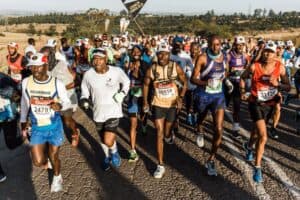Training tips from a nine-time Comrades winner.

The ultra-marathon season is now in full swing and runners from all over the country – and indeed the world – are busy running long distances in training and in races.
Many novices will be venturing for the first time into “no man’s land” – that vast scary void that lies beyond 42km.
Here in South Africa, races such as the Two Oceans (56km), Loskop Marathon (50km) and the Bergville Marathon (52km) are already history.
And even those who did not run any of these races will have run some prodigious distances during the Easter break.
Randburg Harriers’ Easter 100km springs to mind.
Last Saturday I finished my 32nd Two Oceans in the company of a delighted, but also deeply concerned Germiston Callies runner.
After we had asked a race official to snap a photo of the two of us grinning happily while dangling our medals triumphantly, she turned to me and whimpered: “How am I going to manage another 30km? I’m in such trouble.”
I knew exactly why she was so concerned.
The Two Oceans had been a bitter struggle for her (and for me!), made worse by the brutal 8km slog up Ou Kaapse Weg.
Like all of us she had probably been hanging on in those last kilometres, forcing herself on through all sorts of agonies to the finish on the UCT fields.
Another hill or even kilometre of running would have been her undoing.
Like me she was facing a painful hobble just to reach her club’s gazebo and her loved ones.
Unlike me she was also staring at the enormous, seemingly impossible challenge of the Comrades Marathon in
just over six weeks’ time.
The 87km of the Comrades must have seemed like a great insurmountable barrier.
Aspiring Comrades runners all over the world will be asking themselves the same question.
It was a question I asked myself every year I ran the great race.
After staggering in at the end of any ultra I always slumped into a depression, convinced the Comrades was a bridge too far.
As rigor mortis attacked our legs and we hobbled and limped our way from the finish area, I offered my new friend some words of comfort.
“You will cope with the Comrades,” I counselled her.
“And you will come back for another Comrades Marathon in 2020.”
And there are some good reasons she’ll succeed.
First of all, she must ensure she recovers completely from her efforts and gets the 56km race out of her legs.
We took a severe pounding from the steep descents we ran and our legs are stiff and aching with muscle damage.
I advised her to take a complete break from running for at least a week to 10 days.
I would recommend a bit of cycling and walking around the neighbourhood, as long as she has recovered.
Then she must start a slow build-up for the next few days until she has caught up with her normal training routine.
Allowing for a few days of taper and rest before Comrades, she will then start the most intense part of her Comrades
training programme.
By race day on June 9 she will be an even fitter, leaner runner than you she is now.
She will be crammed full of strength, stamina and endurance.
There are still many hills to run and several long, slow training runs to complete.
All this training will sharpen and hone her into a very different runner from the one that struggled up Chet’s Hill
at the end of the Two Oceans.
As race day draws ever closer the sense of occasion will begin to create excitement and determination.
This is not a small rural village marathon qualifier.
This is the Comrades Marathon, rich in history and tradition, and with a charisma that stirs the blood of even the coolest of runners.
You will be starting an epic journey, a personal crusade that will change the way you perceive yourself.
The ritual of the start of the race itself is one of the most stirring moments in sport.
Comrades veterans agree that the singing of the national anthem and Shosholoza, listening to Chariots of Fire
and Max Trimborn’s recorded cockerel crow are immediately worth at least 20 inspired kilometres.
Finally, I convinced my friend that in the next few weeks the most critical transformation will the one that takes
place in her brain.
Her mind will ratchet up a few notches and strengthen her resolve.
Like so many runners on the day she will sail through 56km without even noticing the milestone.
She will be so focused on meeting the challenge of Comrades.
She will run the Comrades in landmarks, progressively crossing off the famous hills and valleys, the villages and towns.
In fact, she will probably ignore the descending distance markers until the distances left to run become realistic.
Perhaps she will have the same experience I did when running my last Comrades in the company of the great Zola
Budd-Pieterse.
We were so focused on the task at hand that we failed to notice the 21km to go board until some wag next to us shouted “Just a half marathon to go guys. We’re nearly there!”
For those who need some inspirational reading material to rouse themselves for battle I have just read an electronic
copy of the much anticipated Running Alone, the autobiography of the great Jackie Mekler.
The five-time Comrades champion’s story is intensely moving and motivating.
For more information on the book, you can email Jackie at [email protected].
For more sport your way, download The Citizen’s app for iOS and Android.
Support Local Journalism
Add The Citizen as a Preferred Source on Google and follow us on Google News to see more of our trusted reporting in Google News and Top Stories.






